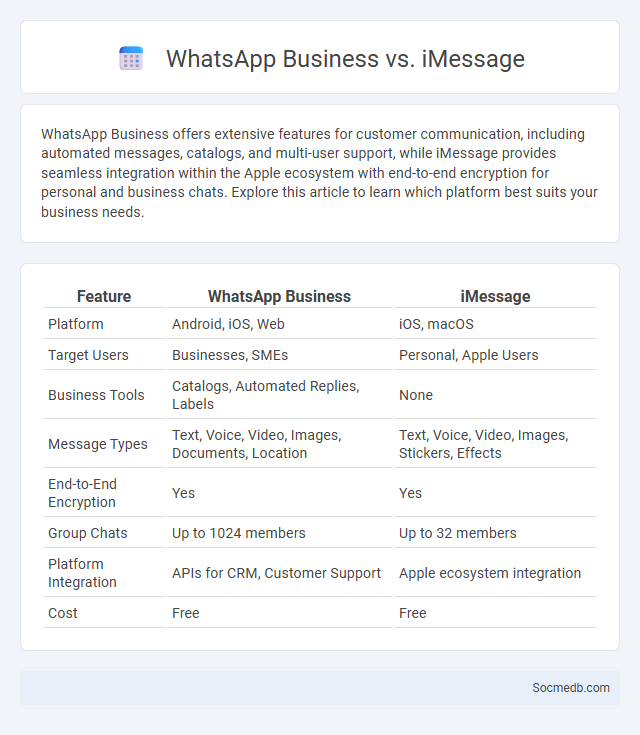
Photo illustration: WhatsApp Business vs iMessage
WhatsApp Business offers extensive features for customer communication, including automated messages, catalogs, and multi-user support, while iMessage provides seamless integration within the Apple ecosystem with end-to-end encryption for personal and business chats. Explore this article to learn which platform best suits your business needs.
Table of Comparison
| Feature | WhatsApp Business | iMessage |
|---|---|---|
| Platform | Android, iOS, Web | iOS, macOS |
| Target Users | Businesses, SMEs | Personal, Apple Users |
| Business Tools | Catalogs, Automated Replies, Labels | None |
| Message Types | Text, Voice, Video, Images, Documents, Location | Text, Voice, Video, Images, Stickers, Effects |
| End-to-End Encryption | Yes | Yes |
| Group Chats | Up to 1024 members | Up to 32 members |
| Platform Integration | APIs for CRM, Customer Support | Apple ecosystem integration |
| Cost | Free | Free |
Introduction: Messaging Platforms for Business Communication
Messaging platforms such as Slack, Microsoft Teams, and WhatsApp have revolutionized business communication by enabling seamless collaboration and instant interaction among team members. These tools enhance productivity through features like real-time messaging, file sharing, and video conferencing, making it easier for Your organization to maintain clear and efficient communication. Choosing the right messaging platform can significantly improve internal workflows and customer engagement strategies.
Overview of WhatsApp Business
WhatsApp Business is a communication platform designed for small and medium-sized enterprises to connect with customers through messaging, automated responses, and catalog features. It supports business profiles, enabling companies to display essential information such as address, email, and website, enhancing customer engagement. With over 175 million users sending messages to WhatsApp Business accounts daily, it plays a significant role in modern customer service and marketing strategies.
Overview of iMessage for Business
iMessage for Business integrates seamless communication between companies and customers directly within the Messages app, enhancing engagement through immediate and personalized interactions. This platform supports multimedia messages, chatbots, and secure encryption, ensuring a rich and trustworthy user experience. By leveraging iMessage for Business, your brand can efficiently manage customer inquiries and promote services in a familiar, user-friendly environment.
What Is a "Business Account"?
A business account on social media is a specialized profile designed specifically for companies, brands, and organizations to promote their products or services, engage with customers, and gain insights through analytics tools. These accounts offer features such as advertising options, contact information display, and performance metrics, which are not available on personal profiles. Platforms like Instagram, Facebook, and LinkedIn provide tailored business accounts to help improve brand visibility and drive targeted marketing campaigns.
Features Comparison: WhatsApp Business vs. iMessage
WhatsApp Business offers advanced features such as automated messages, quick replies, and catalog display tailored for small businesses, whereas iMessage primarily focuses on encrypted personal messaging with rich media support and seamless integration across Apple devices. WhatsApp Business supports multi-device access and robust customer engagement tools, while iMessage integrates with Apple ecosystem features like Memoji, Digital Touch, and SMS fallback. Both platforms provide end-to-end encryption, but WhatsApp Business's business-specific functionalities make it preferable for commercial communication, contrasting with iMessage's consumer-centric capabilities.
Security & Privacy Considerations
Social media platforms collect vast amounts of personal data, making robust security measures critical to prevent unauthorized access and data breaches. Users should enable multi-factor authentication and regularly update privacy settings to control the visibility of their information. Understanding platform-specific privacy policies helps users make informed decisions about data sharing and protect their online identities.
Integration with Other Business Tools
Social media platforms offer seamless integration with essential business tools such as customer relationship management (CRM) systems, email marketing software, and analytics dashboards, enhancing data synchronization and workflow efficiency. This connectivity allows businesses to automate campaign management, track customer interactions, and generate comprehensive performance reports in real time. Leveraging these integrations enables companies to optimize marketing strategies and improve customer engagement across multiple digital channels.
User Experience and Accessibility
Social media platforms must prioritize seamless user experience by offering intuitive navigation, fast loading times, and personalized content tailored to Your preferences. Accessibility features such as screen reader compatibility, adjustable font sizes, and captioned videos ensure that people with disabilities can fully engage with content. Optimizing these elements enhances overall satisfaction and inclusivity, driving higher user retention and broader audience reach.
Pricing and Scalability for Businesses
Social media platforms offer flexible pricing models, ranging from free basic accounts to paid advertising with customizable budgets that suit businesses of all sizes. Scalability is achieved through targeted campaigns and analytics tools, allowing your business to efficiently reach and expand its audience as demand grows. Investing in social media marketing enhances brand visibility while controlling costs and maximizing return on investment.
Choosing the Right Platform for Your Business Needs
Selecting the ideal social media platform depends on your target audience demographics, industry niche, and content type. Platforms like Instagram and TikTok excel for visual storytelling and engaging younger consumers, while LinkedIn caters to B2B marketing and professional networking. Analyzing engagement metrics and platform algorithms ensures maximum reach and ROI tailored to your business objectives.
 socmedb.com
socmedb.com